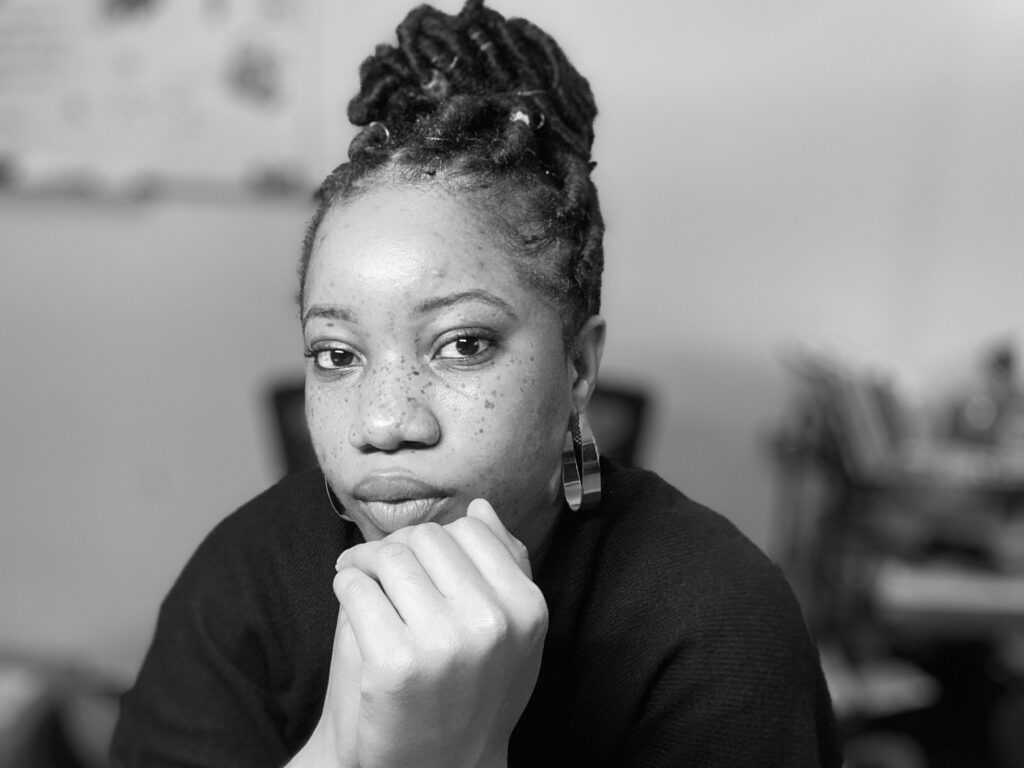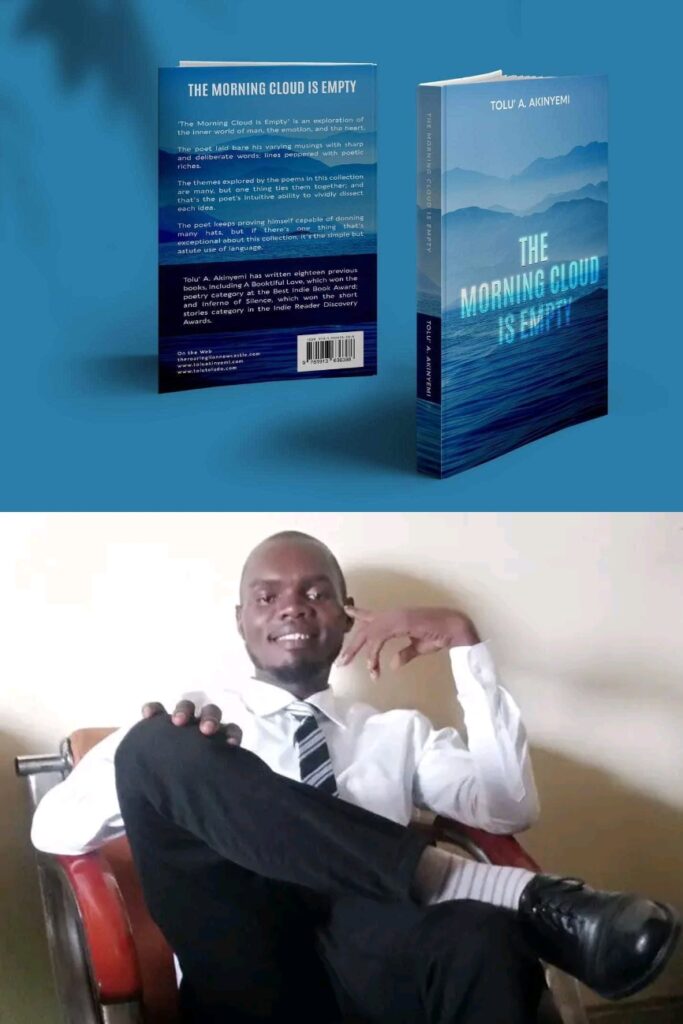Cyborg of Seasons
A personal essay culled from my novel – ECLIPTIC
If I truly mentioned rough plays then, I should tell of the drum survival that almost claimed my life. Until I entered the average, rusted, steel drum and they covered it, I never knew what hell looked like. As if it wasn’t enough. Fat Ruka & Kafaya further crowned the cover with their bums. Soliu and I, inside the drum – dark and dreadful. Instantly, I began to perspire, profusely, and all I saw was two black boys – sweating in their singular grave and my claustrophobia set in. I expected the cover to go aloof as was done for others which made me suppose it was a child’s play and opted in. But it never did. To top it all, Soliu began to deny me access to freedom and solicitation for oxygen. Maybe he had an extra life somewhere. But as for me, I was at my extra time. Perhaps it was time for him to die and he needed an escort. But he wasn’t a king nor was I his abóbakú (horseman). I couldn’t call my mind to reasoning with me. I was choking. By this time, I started raining blows on the top of the coffin which they opened once as if to check and ask, casually, if there was any problem at all. As if it wasn’t too much for death to find a little boy like me. As if the tears on my face were fashionable.
Another hot afternoon, I approached and picked up the frying pan that the big village girls used to fry their dodo which they had sworn not to give me a taste of. I began to move the hot palm oil in it, anticlockwise, with hopes that one or two would be wise enough to escape the harvest of their gathering spoon.
“Longer throat… e pain am” one of the girls, a few steps
Behind, where they were having their Garri and Dodo group lunch, taunted and they all exploded into raucous laughter like jackals.
“That palm oil will soon burn your body” Aunty Titi warned
“You’d better drop it… it is hot o” another warned.
“Leave him… let him…”
“Yee!…ye!” I rushed into one of the serial blue kolanut rubber drums after dropping the fry pan when the hot liquid plummeted and sprawled upon my left arm.
“From frying pan to fire… there’s tarí-tarí (a chemical
used by fishermen, for killing fish in the river, also used for purifying and preserving peeled kola nuts) in the water – inside those drums” she laughed in mockery before rushing in to bring me some harmless stream water. I washed it and the pains rippled down my interior.
The next morning and a week after, I remained isolated as yellow blisters stood scantily, on my left arm until healed with Gentian Violet – after they burst-opened.
Christmas, in the village, was fun and funny. I marvelled at the generosity of people as they began to net across, combing the nooks and crannies, blessing their neighbours with plates of delicacies. Compared to the on-your-own way at Abuja. Despite the numerous suspicions and superstitions in Yorùbá land, these primitive folks understood that there’s more in our humanity that kept us together than those things that pulled us apart. You don’t need to cook before you feed another. And by this, the food you ate was perhaps a pilgrim through several rooms.
So far, the village had been interesting and I was glad I’d be resuming school with the KÓGIMÁYAs & the DÉBORÍ twins, OBEY ADÉYEMO, RUKA, SHADIYA, AHMED, SHARAFAH, FÀRÁNSÙN and others. BOBO too would be resuming & mother handed us over to the big, village boys after the first day escort to the ALL SAINTS ANGLICAN NUR. & PRY. SCHOOL, OLÓRUNKÉMI – about 4 kms away from home – through a thick bush – almost a forest but for the suspension of trees at certain junctions plus the road was wide enough. Also, merchants wouldn’t stop threading. Which made it easier for the village women to panic less about the safety of their trekking children/wards.
My first day in a classroom was nothing close to sense, at all. A man was standing before the students who sat in twos within each bench and table. Noises of recitation almost deafened my ear. All sounding like the rumbling of battles. Even the man could tell that I was completely lost in a wonderland when he asked me to recite the Yorùbá alphabet (a b d…) he was shocked at first, that I couldn’t attempt to pronounce anything even after half of the class had enjoyed the morning with such a cheap exercise in the stead of their rigorous ones. Then he ordered me to sit after realising that I was a new intake. I took a brisk survey on the blackboard and the white stuff (chalk) used to scribble on it. I scanned the olùkó (teacher) in his Blanco white T-shirt, short sleeved, and traced with my eyes, his black suspenders, down the hook – strapped to his short khaki knickers and his mighty pair of black and shiny shoes. Then, I took a snappy look at my classmates in their green uniforms – boys – lemon & national green – intertwined for the shirt over green knickers. And girls – the same top as the boys’ with green pinafores. Break, Bobo and I would buy #5 puff puff in two places. Eat one and keep the other in my locker. Then jump out to the field of play to catch grasshoppers in the manner of the rest of the pupils. The school field was still carrying its bushy hair since the holiday and there were enough games for happy children. After break, Bobo would insist on following me with tears, to my class until embarrassment ensued and his teacher would be forced to let go of him. Then we consumed the left snack and scampered home again.
But could this be all that education connoted? Maybe education was all about the infusion of motivational cultural rhythm (isé àgbè n’isé ilè wa) that we chanted on the assembly ground every morning. Maybe education was only the infusion of irrelevant vernacular phrases into the noble national anthem [arise o, compatriots (oba adédàpò) Nigeria’s call obey (ó gbé’ye s’íkùn) to serve our fatherland (ìyá rè ló fàá)…] And the leniency of the teachers on the children of herbalists who wouldn’t come to school without a fortified ring, at least, one in their pockets in case another school invaded, is another thing to talk about. Maybe school, too, was a battlefield where you only sit in a classroom in obedience to a loin-faced teacher, soaked in fear of plenty unknowns – a sudden summon to answering his inscrutable questions, a strange splash of Cutlass on the wall and clanging of woods against the window of a peaceful classroom or a troop of boys – approaching, abreast, with rage, from the school field and commotion would replace a serene learning environment. Maybe education was just an excursion to witnessing the massacre of potentials after every organised competition and a necessity to brace up within this prank with death and lay a hold on a blank certificate at the end of every successful survival attempt.
It only was and always would be a vague assumption that the rather certain suspicion of boy-girl obscenity within the school especially in the senior classes within bearded and pumped students, had gotten to the interest of the pedagogues, too. Because, the straight and rocky faces of the suspected male instructors were enough strong kick against the sandcastle of such assumption– leaving one sceptical.
But I didn’t want to believe that that was what education meant. Anyways, I was just a kid who wanted to enjoy his timed liberty and cared less about what ached in the head of the elders.
*******
Religion is another crucial phase of life that cannot be pushed aside in stories like this. THE APOSTOLIC CHURCH– where we worshiped was the average of the three in Olórunkémi village. I had no intriguing urge for the CHERUBIM & SERAPHIM (C&S) behind our house but I wondered why father didn’t choose the exotic church up the street beside the baalè’s residence, where dignitaries from the city and big men of the village worshipped. Even though they had their bàñté properly, strapped around their waist, and covered with flowing agbádás and their ìfúnpá tied firm under their sleeves. They would say “religion never negated tradition”
Later, I came to the light of the whole thing that father was only obliged to loyalty towards pastor Adéyemo who lived a stone throw away from our house and prayed often with us.
It was worth it. But I couldn’t erase the memory off my head and believe that we would return back to that church of ours after the vigil in that beautiful and spacious church. We barely had vigils in our church. So, nothing hindered us from gracing the invite for the “power packed vigil” as read by big brother and big sister from the distributed black & white fliers by the rally volunteers one evening, in OLORUNKEMI village. Generator was in use – a big one at that. Fancy bulbs – ubiquitous – and it looked like daylight. I couldn’t mimic the preachers who took turns and prophets who invoked the power of God into the vast auditorium like I enjoyed doing every Sunday evening. Even I couldn’t explain, whenever asked, how I managed to cram pastor Adéyemo’s sermon. Everyone at home would, after hearing me say “praise the Lord ”, be ready to hear the pastor’s sermon again and laugh at my childish version of his demonstrations. Heaven forgive! I was only a gifted child. Mother, at times, would end my sermon, abruptly, after laughing tirelessly, and say “stop! It is blasphemy” Perhaps, my mind was more engrossed in the worship session and the powerful songs of Victory chanted with passionate charisma by the choir & the consecutive worship leaders. The like of “ìdè mi já o hallelujah, mo dé’leayò, (my shackles are broken, hallelujah, I arrive home happy) agbára èsù dà n’íbití jésù ti ñ joba? (Where’s the power of the devil where Jesus reigns?)
I saw fine girls caked in dust– under the influence of the anointing. There was a guffaw like thunder from the clashing cymbals and the striking flips and squeezes and screams from the oppressed that were on the verge of their deliverance. “There are too many witches in this village.” This thought trekked across my mind and for the fear of any wahala, I waved it off and continued singing with my two eyes open but against the floor because darkness was the worst thing to see at that hot moment. But mother would tell me to close my eyes to be safe from being possessed by the vacating demons. It was this same green dàñsíkí that I wore the day she gave me a knock, during a service, on this same issue.
But these pastors were truly powerful. They would only lay a hand on you and you would ripple away like a piece of wool before the wind. Contrariwise, the bàbás of the village would need to tuck a soaked ring in their fingers or chant incantations with àfòse to cast a spell. No wonder they marched out to avoid any clash of “the confluence of powers.” But these pastors, too, like our village herbalist, spoke strange languages different from incantations. Maybe they both had the same source of power. But one is pure and the other is manipulated I suppose.
I poised to see how it felt to launch off this realm. I prayed to be touched by one of these men. One did. But I didn’t ripple like KAUSARAT, DEBORAH, SHADIYA, IYA ELEJA, IYA OLOGI and a few other boys and men. Then, I began to think, after the programme that was brought to an end around 5am, if it meant that I had a demon which was fiercer than the rest and so, the power got nothing on it on my inside. But it would be a camel crawling through a needle eye to doubt such wonder-working power that even called a dead body back to existence. Perhaps, I, too, was spiritually sound since I was somewhat a pastor myself. I thought and smiled along with others.
But father kicked at my speculation on Sunday as we marched down to our church in an uninterrupted queue. The order of things remained rigid that I always knew what would follow the next session after praise and worship. The next thing before and after the choir’s ministration which would usher the pastor to the podium – nothing higher than the floor of the congregation save for the space and the wooden pulpit which I for long, wondered what magic held the Bible from falling off its sloppy top, and the grace would be shared. The women would stay back for holy gossip while the men would chat briefly, with strong laughter, credit the pastor (not excellently like the kneeling-talented women) and hurry home. They would need to prepare their guns for the kids of the forest, night round.
“Somebody!”
“Pastor! Happy Sunday, sir”
“Sharp sharp… you’re heading home already”
“Hehehe… pastor, way to the throat, way to heaven”
“No, no, no… Jesus is the only way. And besides, man must not live by bread alone”
“Exactly! That’s why the bush meats are needed”
“Hehehehe”
Father’s eyes seemed closed into something like the greater and less than sign respectively, whenever he laughed. And the space right before his hidden teeth reminded me of his fight with a uniform man. Back then in Abuja, He always found interest in marginalized people’s cases. He’d stopped and slapped a soldier after confirming that the young man on the ground was knocked down and abandoned by this man. It was a military-civilian tussle. Father grabbed his hand and released three shots into the air before he lost his tooth when the handle of the gun punched his mouth. People fled. He was spitting blood. The soldier too had got his uniform torn. Blood soaked his torn uniform to some delicate parts of his fair skin. Shortly after, a van containing uniform men came and drove away with them both. The story had it that it was settled amicably, and the two became friends after an exchange of gifts. Justice was still alive in Nigeria at that time. But there was an eventful day at church. I read it in capital letters, on my father’s face, that something had been stolen from him. But he could still fake smiles. Repeatedly, he entered and came out of the pastor’s office with àjàlá – the eldest of an urhobo woman’s children who lived up the village. Àjàlá was known for stealing but had his way of maneuvering facts and with the extortive inference of his mother, he would leap over penalties.
“But there was always a day for the owner”
“Yes” a few crowds replied
“Now that you’ve sworn… Ògún, the god of iron will do his work” Adífálà – the village chief Priest said.
The #1,000 must have mattered to father so much that he summoned him to the traditional shrine, after his persistent denial despite the appealing sermons from the elders of the church. Months later, news of Àjàlá’s death from a fatal accident got to the village. Until now, I never cared about what aches in the head of the elders.
Contributor’s Bio
Psalmuel Benjamin Oluwasheun is a poet, writer and spoken word poet from Nigeria. He is the author of REUNION and also a co-author of JOURNEYS – an anthology on Displacement and migration by the NOBEL LAUREATE – Prof. WOLE SOYINKA and the providus bank.
He writes from Ewekoro in Ogun state. He’s the 2nd runner up of the PROFWIC SPOKEN WORDS POETRY CONTEST 2022, A quarterfinalist of War of Words9 2022, winner of Shuzia Thursday poetry challenge Sept., 2022, finalist at POF4 (pen on fire) Longlisted for BOPP poetry prize 2022 with works published on PAROUSIA, CC, LUMIERE REVIEW, Agape, ARTS LOUNGE, EskimoPie mag, Lion and Lilac, Allegro, Shuf Poetry, Communicators’ League, MixedMag, Nanty Greens, Kalahari Review, My Woven Words, Fieryscribe Review and others are places where you can find his works.
If he’s not writing, he’s doing a whole lot of other things like drama, painting, preaching and all. You can reach out to him via instagram @Spokespsalmuel



